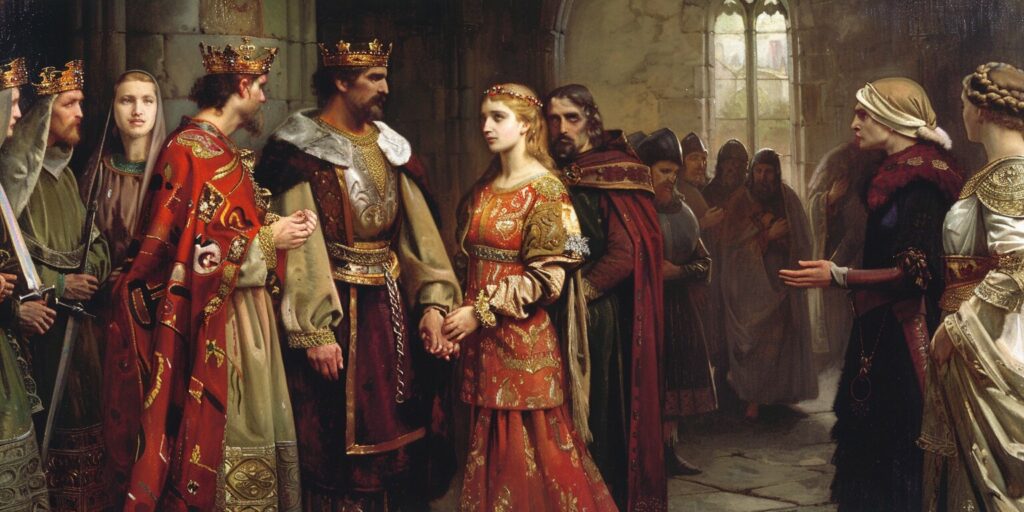Welcome to our article on King Edmund of England, a remarkable figure who exhibited both valor and vision during the Viking Age. King Edmund’s legacy is essential to English history, and his contributions continue to resonate today. Join us as we delve into this influential ruler’s life, reign, and impact.
King Edmund’s leadership during the Viking Age was characterized by his unwavering determination to defend his kingdom and restore stability, often against Danish invaders. His actions shaped the course of English history, leaving a lasting impact on the country’s development. This article will explore King Edmund’s early years, his ascension to the throne, and the significant military campaigns he undertook to protect England from Viking invaders.
Join us as we uncover the fascinating life of King Edmund, his triumphs and challenges, and his enduring legacy that continues to inspire us today. Let’s embark on this journey to discover the valor and vision of King Edmund during the Viking Age.
Early Life of Edmund
King Edmund, born in 921, was the son of King Edward the Elder and his third wife, Eadgifu. He grew up in a time when England was constantly under threat from Viking raids and invasions. Despite the turbulent times, Edmund received a comprehensive education and was groomed for future leadership. His family background, with close ties to the ruling dynasty, played a crucial role in shaping his character and values.
As the son of Edward the Elder, a powerful ruler of the time, Edmund’s upbringing was influenced by the political and military atmosphere of the era. His father’s legacy as a formidable leader and his involvement in defending England against Viking invaders would have undoubtedly shaped Edmund’s understanding of kingship and the importance of protecting his kingdom.
The constant threat of Viking incursions marked Edmund’s childhood. These raids disrupted daily life and directly threatened the royal family and the kingdom’s stability. Growing up amidst such turmoil, Edmund experienced firsthand the consequences of Viking aggression and the urgent need for a strong and capable ruler.
Despite the challenges, Edmund’s family ensured he received a comprehensive education befitting a future king, including understanding the complex dynamics involving the Danish and Scots. He was taught subjects such as history, law, and languages, equipping him with the knowledge and skills necessary for governance. This education also fostered a sense of pride in his Anglo-Saxon heritage and instilled in him a deep understanding of the importance of maintaining a strong and united England.
Moreover, Edmund’s family background provided him with invaluable connections within the ruling elite. Being the son of King Edward the Elder, he had access to influential figures and mentors who could guide him on his path to becoming a monarch. These connections played a crucial role in Edmund’s early political career and his eventual ascension to the throne.
Therefore, Edmund’s early life was shaped by his family background, turbulent times, and the need for a strong leader in the face of Viking threats. His comprehensive education and the valuable connections he gained paved the way for his future as a formidable king.
Edmund’s Ascension to the Throne
After the death of his half-brother, King Athelstan, in 939, a succession crisis gripped England. Edmund, at the age of 18, emerged as a strong contender for the throne. Despite rival claimants’ challenges, he secured the crown and became the King of England. His ascension marked a turning point in the fight against Viking invaders, as he was determined to defend his kingdom and restore stability.

The succession crisis posed a significant threat to England’s stability. King Athelstan’s passing left a power vacuum, and rival factions vied for control, plunging the country into uncertainty. Edmund the Magnificent emerged as a beacon of hope in this chaotic atmosphere.
Edmund’s rise to power showcased his strategic acumen and ability to rally support. He adeptly navigated the complexities of the succession crisis, leveraging his charisma and decisive leadership to win over the people’s hearts and secure the backing of key allies.
His determination to protect England from Viking invaders further bolstered his claim to the throne. Recognizing the pressing need for a strong leader, the people rallied behind Edmund, seeing in him a champion who would defend their lands and restore peace and prosperity.
With his coronation, Edmund embarked on a mission to fortify England and establish his authority as king, notably through significant engagements in locations like Pucklechurch. He understood that they could only withstand the onslaught of Viking raids through a united front. Edmund’s ascension marked the beginning of a new era, one defined by strength, resilience, and a commitment to the welfare of the English people.
King Edmund’s Contributions and Policies
King Edmund of England implemented a range of policies to protect his kingdom and fortify its defenses against Viking invaders. Recognizing the need for strategic measures, he fortified key cities, bolstered the military, and forged alliances with neighboring kingdoms.
One of King Edmund’s significant military campaigns was the Battle of Brunanburh in 937. In this historic battle, he led a coalition of English and Welsh forces against a formidable Viking coalition. This decisive victory repelled the Viking invaders and solidified Edmund’s reputation as a skilled tactician and leader.
Under his rule, Edmund’s contributions laid the foundation for a united and resilient England. His strategic policies and military triumphs fortified the kingdom and significantly weakened the Viking threat. By proactively defending his lands, Edmund ensured the safety and security of his subjects, leaving a lasting legacy in English history.
Military Campaigns and Defense
Viking invasions constantly threatened King Edmund’s kingdom throughout his reign. Edmund undertook various military campaigns to safeguard his realm, demonstrating his unwavering commitment to defending the kingdom from Viking incursions. Through his decisive actions and strategic military planning, he successfully repelled numerous Viking invasions, ensuring the safety and security of his people.
Engaging in battles across the country, King Edmund confronted Viking forces head-on, pushing them back and effectively countering their attacks. His military actions showcased his exceptional leadership and tactical prowess, especially in his interactions with key figures like Olaf Guthfrithson during pivotal moments of conflict. Two significant events exemplify his dedication to defending the kingdom: the Siege of Leicester in 942 and the Battle of Strathclyde in 944, the latter crucial in protecting the regions of Cumbria. These engagements with Viking invaders served as turning points for King Edmund in securing the stability and protection of England.

During the Siege of Leicester, Edmund’s strategic fortifications and well-coordinated defense ensured the city’s successful defense against the Viking onslaught. The Battle of Strathclyde fought against a Viking coalition led by Olaf Guthfrithson from Dublin, resulted in a decisive English victory, halting the incursion and further solidifying Edmund’s status as a formidable opponent.
King Edmund’s military campaigns and resolute defense efforts played a vital role in safeguarding England against Viking aggression. His commitment to protecting the kingdom and his skillful engagements with Viking invaders left a lasting legacy, reinforcing the strength and resilience of the Saxon dynasty during the Viking Age.
Edmund’s Legacy and Succession
King Edmund’s reign had a profound and lasting impact on England, leaving behind a rich legacy that would shape the course of the nation’s history. His military successes, administrative reforms, and unwavering commitment to defending the kingdom earned him the well-deserved epithet “Edmund the Magnificent.”
However, King Edmund’s untimely death in 946 triggered a succession crisis and destabilized the kingdom. The question of who would succeed him became a matter of great concern and contention, leading to conflicts among different factions vying for power.
Ultimately, Edmund’s younger brother, Eadred, ascended to the throne as King Edmund’s successor. However, the aftermath of the succession remained tumultuous, with ongoing power struggles and challenges for future rulers.
The succession issues that arose after Edmund’s death had significant repercussions for the stability and governance of the kingdom. The conflicts between rival factions persisted, creating a fragmented and volatile political environment involving Danish settlers and their influence in English territories.
In the years that followed, England continued to grapple with the aftermath of Edmund’s reign and the challenges posed by succession disputes. It would take time for the kingdom to regain stability and restore a sense of unity.
The legacy of King Edmund and the succession issues that arose in the wake of his death serve as reminders of the complexities and challenges of royal governance. The impact of Edmund’s reign would continue to shape the course of English history, influencing subsequent rulers such as Eadwig and leaving a lasting imprint on the nation’s political landscape.
Facts About King Edmund
In addition to his valor and vision in defending the kingdom against Viking invaders, King Edmund, king of the English, had several interesting aspects to his life that are worth exploring. These lesser-known facts shed light on his character and provide a deeper understanding of the context in which he ruled.
One fascinating fact about King Edmund is his marriage, which served to strengthen his alliances with neighboring rulers, including Malcolm of the Scots, in 945. He was married to Ælfgifu of Shaftesbury, who hailed from a prominent noble family. Their marriage solidified alliances and showcased King Edmund’s ability to establish diplomatic relationships, notably with Malcolm of the Scots.

Another intriguing aspect of King Edmund’s reign is his interactions with other rulers. He maintained friendly relations with his cousin, King Olaf Tryggvason of Norway, who played a critical role in the spread of Christianity. This demonstrates King Edmund’s openness to cultural exchange and his efforts to foster international connections.
Anecdotes from King Edmund’s reign also offer interesting insights. One such anecdote involves his encounter with the notorious Viking raider Leif Erikson. It is said that King Edmund invited Leif Erikson to his court and engaged in a game of chess with him, showcasing his strategic thinking and willingness to engage with Viking figures.
These facts about King Edmund provide a glimpse into his life beyond his valor in battle. They offer a broader perspective of his character and accomplishments, showing the depth of his personality and the legacy he left behind, including his efforts to integrate regions like Northumbria into his reign.
King Edmund in Historical Context
The Significance of King Edmund’s Legacy
King Edmund of England played a vital role in shaping the course of English history and the Viking Age. His valor and vision during his reign had far-reaching consequences that continue to resonate to this day. By understanding Edmund’s role in the broader historical context, we can gain valuable insights into the significance of his legacy.
Shaping the Fight Against Viking Invaders
One of King Edmund’s key contributions was his unwavering determination to defend England against Viking invaders. His military campaigns and defensive strategies created a formidable resistance against Viking incursions. Edmund’s strong leadership inspired his people, fostering unity and resilience in the face of adversity. His relentless efforts laid the foundation for a more secure and united England.
Influence on Future Rulers
King Edmund’s reign set a precedent for future rulers in England, especially in his dealings with nearby realms and entities such as Dublin and the Scots. His commitment to strengthening the kingdom and implementing effective policies provided a blueprint for subsequent leaders. Edmund’s legacy influenced the mindset and strategies of future rulers, who likewise recognized the importance of defending the kingdom against threats like those from Northumbria and prioritizing the welfare of their subjects.
The Viking Age and Lessons from King Edmund
The Viking Age was turbulent in English history, marked by constant Viking incursions and political instability. King Edmund’s bravery, resilience, and vision for a united England serve as a powerful reminder of the challenges faced by early English kings. Edmund’s legacy reminds us of the importance of strong leadership, strategic defense, and the preservation of national identity in the face of external threats.

